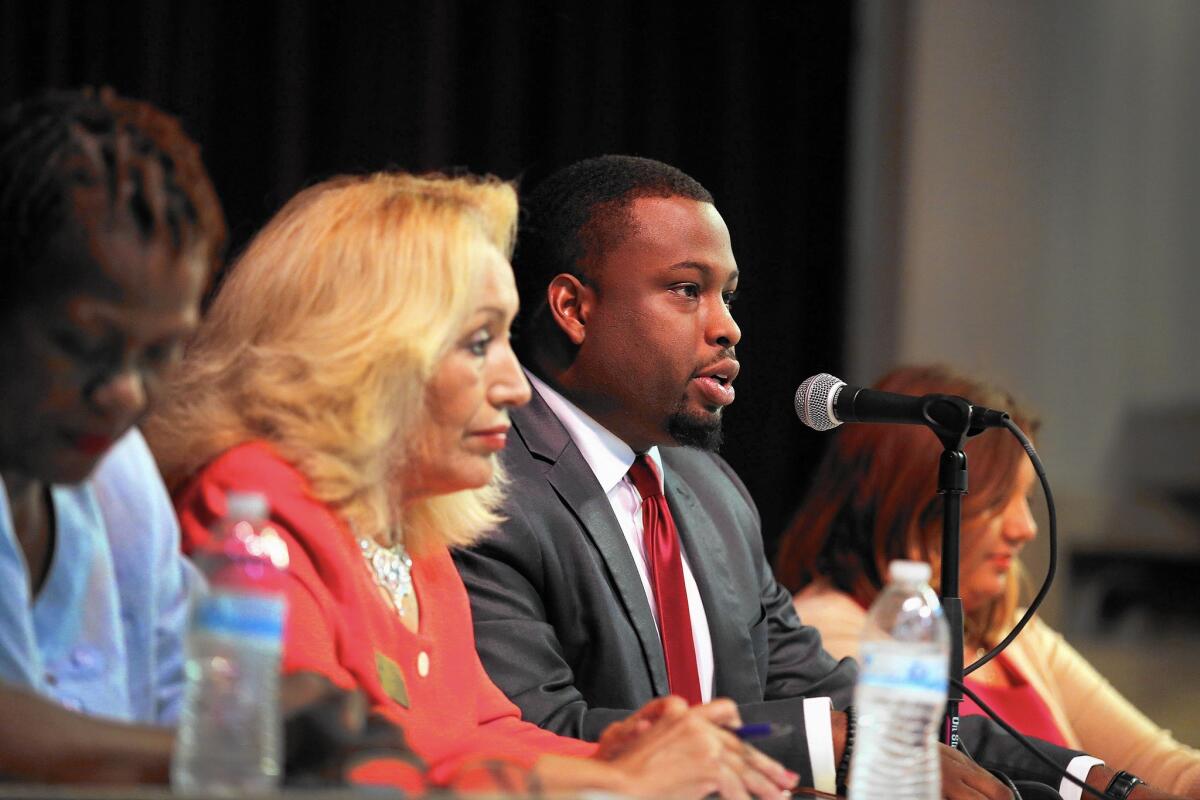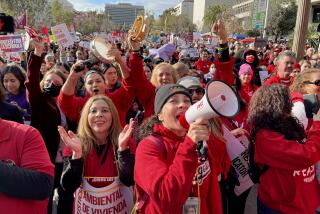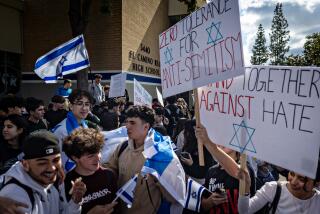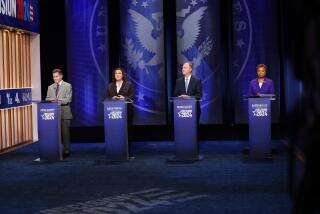Students go big for extra credit and get a taste of real-life politics

Lynwood school board candidate Gary Hardie addresses the audience at the student-organized debate Wednesday.
On the night that Republican candidates for president of the United States took turns beating up on each other and the media, the students at Marco Antonio Firebaugh High School in Lynwood held a debate of their own. The mayor ended up being booted out of it, and a group of angry people, including community activists and parents, milled outside.
The students organized the debate between candidates for the school board as part of their high school graduation requirements and discovered that local politics can be just as bitter, complicated and full of finger-wagging adults as it looks like on TV.
“We didn’t anticipate for it to be this difficult, because when we barely started, the administration said it was a good idea,” said Jorge Perez, 17. “But once we tried to keep moving forward, there were a lot of obstacles in the way.”
Or as one Lynwood resident, Arturo Ramos, put it: “They got a good lesson of the negative side of the politics.”
Let’s go to the beginning: The 10 seniors could have painted a mural on campus, organized tutoring for elementary schools or planned a hike to get credit hours toward their international baccalaureate diploma.
Instead they decided to go big by hosting a debate for five Lynwood Unified School District candidates: three incumbents and two challengers. The teens thought it would be a good way to introduce them to the community.
“We wanted it for them to know their ideas and see what they have in store, so when they were elected we could hold them on it,” Perez said. “A lot of the time, the community doesn’t even know themselves who their school board members are or what they’re doing for the community.”
But even getting to the actual debate was harder than they expected. They found that they couldn’t host it on campus because of the possibility that it could raise issues of political partisanship for the district. They reserved a space at Bateman Hall, a city facility, and because the students went through the school district and the debate was deemed an educational event, the rental fee was waived.
Then, on Oct. 23, the students said, school administrators questioned who had given the students permission to hold the event, despite initially expressing support. A student organizer said she was told the students’ reputations could be affected as well as that of any teachers or school staff involved if anything went wrong.
And the day before the Wednesday night debate, the group received an email from city officials, informing them that they could no longer hold the event at Bateman Hall because of fear that it would turn into a partisan free-for-all.
“They didn’t want the candidates to be attacked,” Perez said. “Our point wasn’t for the candidates to be attacked; our point was for parents and citizens to come together to hear their ideas.”
Shortly after, they received another email saying that they could hold the event, but that only students could attend. When the school district assistant superintendent met with the students that day, he told the group that the district had an agreement with the city allowing them to use Bateman Hall at no cost — but only for educational activities.
“Basically what the issue with the city was, that if we open it up to adults, it wouldn’t be educational, it’d be a political activity,” Gudiel Crosthwaite told them.
“I’m just here because I want to make sure that you guys know, proceed with caution. It’s a great learning experience, but you’re dealing with adults and you’re dealing with a high-stakes event here, and not everyone is going to interface with you like your teacher may,” Crosthwaite told the students. “I want to make sure that you are aware of that and that you exercise caution.”
If students wanted to open the event to the public, he told them, it would cost around $120. But students said that when they had checked on the cost they were told by Bateman Hall staff that it would be $1,500, which they said they were unable to raise in 24 hours.
No adults, aside from those chaperoning the students, would be allowed into the Bateman Hall auditorium for the event — a decision that would have repercussions later.
District officials say students most likely didn’t receive the price from the correct person, and that district officials supported the event.
“I think they did a great job in navigating a system as students and also I hope that they learned in terms of what it entails behind the scenes and the politics involved, not only in securing a venue but learning about funding restrictions,” Crosthwaite said in an interview Thursday. “As a school district, we encourage our students to engage in civic activities, to be active in their community. I’m glad that they were able to experience all this.”
Despite the last-minute changes and other difficulties, at least 100 students packed into the auditorium on debate night, tucking skateboards, scooters and gym bags under chairs and propping notebooks on laps. They took notes for extra credit.
Four of the five candidates attended, sharing the stage with teenagers dressed in slacks and blazers — in sharp contrast to the crowd, outfitted in basketball shorts, untied Converse Chuck Taylors and shirts with band names.
Some students surfed the Web on their phones, and during a brief intermission, many rushed to snap selfies with candidates, who happily obliged.
Throughout the debate, candidates answered questions about school security, facility issues and other topics. But unlike the GOP debate, in which the candidates thrashed one another, President Obama and the CNBC moderators, the most dramatic part of the night happened offstage. Outside, students were turning away adults.
“This looks like a high school reunion, we don’t belong here,” said Maria Garcia, mother of one of the candidates running for school board, who didn’t attend the debate. “Usually the debates are with parents, because who’s involved with the school? Parents.”
“It’s only for students,” Garcia told another woman in Spanish, as she walked into the building, “even though they don’t vote.”
“The students wanted parents to attend,” Luis Flores, a teacher helping coordinate the event, explained to those trying to get in.
At one point Flores asked Lynwood Mayor Jose Luis Solache, who had made it into the debate, to leave in order to be fair to several other people who had been turned away.
“They just kicked me out,” Solache told angry community members outside. “I think they should let people in; it’s a public facility.”
Soon, the mayor was directing people in the small group to go inside to watch the debate.
“I can assure you [the students] won’t get charged,” Solache told Flores. “This is actually absurd.... I mean, they kicked me out. It makes no sense.”
Just before 7 p.m., the adults waiting outside were allowed in, just in time to hear the candidates make their closing statements. Moments later, everyone filed out, with students grabbing extra credit slips to show their teachers.
Vanessa Acuna, 17, one of the moderators, said she wished that the parents had been let in for the whole event, noting, “They’re the ones doing the voting.” However, another student, Judith Arguello, also 17, said she was disappointed by many adults’ attitude that, “You can’t do it. So we were let down because of that.”
Twitter: @brittny_mejia
ALSO:
Russian airliner carrying 224 crashes after takeoff in Sinai
Automakers struggle to bring affordable diesel cars to U.S. market
Chinese recall sacrifices under one-child policy, ponder what’s next
More to Read
Start your day right
Sign up for Essential California for news, features and recommendations from the L.A. Times and beyond in your inbox six days a week.
You may occasionally receive promotional content from the Los Angeles Times.







